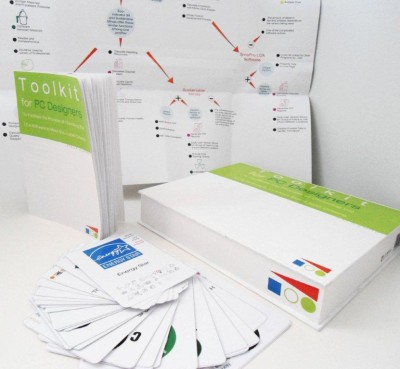As more and more electronic products get tossed aside, we have a massive e-waste problem. One of the major contributors to e-waste is personal computers.
Hala Zohbi, a master’s student in the Industrial Design (MDes) program, decided to tackle the problem head on. She researched and then created a toolkit that would help designers choose a life cycle assessment tool in order to develop environmentally-friendly PCs that meet eco-label criteria.
Zohbi says: “A survey analysis showed that most professional designers are not aware of their role in developing more environmentally-friendly PCs, nor the types of Life Cycle Assessment (LCA) tools that are already developed to help them do so, and they are also unaware of the type of contribution they may have in meeting certain eco-label criteria.”
She also points out that PC’s with eco-labels have a rising consumer demand and can influence a company’s reputation and sales.
Her toolkit is composed of a map, issue cards and a manual. The map illustrates different LCA tool options for the designer. The issue cards are used to illustrate the different types of eco-labels available, and the manual explains how the tools work together in order for the designer to use them correctly. This helps the designer decide which LCA tool they should use to meet eco-label criteria during the development and design phase of their product.
“Personally, I hope that my toolkit will raise PC designer’s awareness on the impact they can have in developing environmentally-friendly products and cause the PC design industry to cut back on e-waste that is sent to landfills and emits harmful chemicals into the atmosphere,” says Zohbi.
 Zohbi worked with an industrial design-product development consultant, and with clients that include HP and LG, to test her toolkit. She also tested it on several of her colleagues in the MDes program at Carleton.
Zohbi worked with an industrial design-product development consultant, and with clients that include HP and LG, to test her toolkit. She also tested it on several of her colleagues in the MDes program at Carleton.
During her grad program at Carleton, Zohbi worked on a number of other projects including redesigning the ID undergraduate space to become more effective for students, which allowed her to utilize her previous experience as an interior designer and integrate that into the project. She also worked with a team to design a system that would help track an elderly person’s eating habits. “This would facilitate their ability to live alone, while having their family constantly aware of how they are eating and taking care of themselves,” she explains.
Zohbi will be graduating from Carleton on June 7. She says the graduate ID program here has given her an advantage. “The industrial design program at Carleton is internationally known and respected. This degree has expanded my knowledge on interdisciplinary design and sustainable design, which are both becoming more popular in the field and will provide me with a leg up on the competition when entering the job market.”
Adds Zohbi: “The MDes program is a great place for someone to consider pursuing their master studies because the courses here really change a person’s whole perspective towards design research. The courses allow students to feel fully prepared and confident with conducting their own design research in a topic of their choice.”
“I was given the privilege to have Lorenzo Imbesi as my thesis supervisor. The passion he has for teaching and the design program itself is shown in his constant efforts to help all his students excel in their projects in the best way he can. Tony Bailetti is a professor from the department of Systems and Computer Engineering, and he was also my thesis supervisor. He provided me a lot of motivation and encouragement throughout the process of writing my thesis.”
Monday, May 28, 2012 in Convocation, News
Share: Twitter, Facebook






